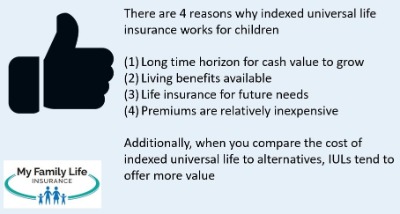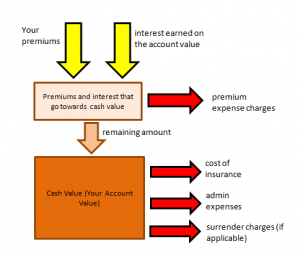All Categories
Featured
Table of Contents
Do they compare the IUL to something like the Vanguard Overall Supply Market Fund Admiral Shares with no load, a cost proportion (ER) of 5 basis points, a turn over ratio of 4.3%, and an exceptional tax-efficient document of distributions? No, they contrast it to some terrible proactively handled fund with an 8% tons, a 2% EMERGENCY ROOM, an 80% turn over ratio, and a horrible record of short-term resources gain distributions.
Mutual funds often make yearly taxed distributions to fund owners, also when the worth of their fund has gone down in worth. Common funds not just require income coverage (and the resulting annual tax) when the common fund is rising in value, however can additionally enforce revenue taxes in a year when the fund has actually dropped in value.
That's not how common funds work. You can tax-manage the fund, gathering losses and gains in order to reduce taxed distributions to the investors, yet that isn't in some way mosting likely to transform the reported return of the fund. Just Bernie Madoff kinds can do that. IULs avoid myriad tax catches. The ownership of shared funds might need the shared fund proprietor to pay projected taxes.

IULs are very easy to position to make sure that, at the proprietor's fatality, the beneficiary is exempt to either revenue or estate tax obligations. The very same tax decrease strategies do not function nearly too with shared funds. There are countless, usually expensive, tax obligation catches associated with the timed buying and selling of shared fund shares, traps that do not put on indexed life Insurance policy.
Possibilities aren't extremely high that you're going to undergo the AMT as a result of your shared fund distributions if you aren't without them. The remainder of this one is half-truths at ideal. While it is real that there is no earnings tax due to your heirs when they acquire the proceeds of your IUL policy, it is also real that there is no earnings tax due to your successors when they acquire a common fund in a taxable account from you.
Universal Life 保险
There are better ways to prevent estate tax problems than buying financial investments with low returns. Mutual funds may cause revenue tax of Social Protection advantages.

The growth within the IUL is tax-deferred and may be taken as free of tax earnings via loans. The policy owner (vs. the mutual fund supervisor) is in control of his or her reportable earnings, thus allowing them to lower or perhaps remove the tax of their Social Safety advantages. This one is great.
Right here's another very little problem. It holds true if you buy a shared fund for say $10 per share prior to the circulation day, and it disperses a $0.50 distribution, you are then going to owe taxes (most likely 7-10 cents per share) although that you haven't yet had any kind of gains.
In the end, it's really concerning the after-tax return, not exactly how much you pay in tax obligations. You're also most likely going to have even more cash after paying those taxes. The record-keeping needs for owning shared funds are dramatically a lot more complicated.
With an IUL, one's records are maintained by the insurance coverage business, duplicates of annual statements are sent by mail to the proprietor, and circulations (if any type of) are completed and reported at year end. This one is additionally type of silly. Obviously you ought to maintain your tax obligation records in case of an audit.
Fixed Index Universal Life Insurance Pros And Cons
All you need to do is shove the paper into your tax folder when it appears in the mail. Barely a factor to purchase life insurance. It's like this individual has never invested in a taxable account or something. Mutual funds are generally component of a decedent's probated estate.
Furthermore, they undergo the hold-ups and costs of probate. The earnings of the IUL plan, on the various other hand, is always a non-probate distribution that passes outside of probate straight to one's named beneficiaries, and is consequently exempt to one's posthumous lenders, unwanted public disclosure, or comparable delays and prices.
Medicaid incompetency and life time revenue. An IUL can supply their proprietors with a stream of earnings for their whole lifetime, regardless of just how long they live.

This is helpful when organizing one's events, and converting properties to earnings prior to a retirement home arrest. Common funds can not be converted in a comparable manner, and are generally considered countable Medicaid possessions. This is another foolish one supporting that bad people (you recognize, the ones who need Medicaid, a government program for the bad, to spend for their nursing home) ought to utilize IUL instead of common funds.
Universal Life Safety Products
And life insurance policy looks terrible when contrasted fairly versus a retirement account. Second, people that have cash to purchase IUL above and past their pension are going to have to be terrible at taking care of cash in order to ever before get approved for Medicaid to spend for their assisted living facility prices.
Chronic and terminal illness motorcyclist. All plans will certainly permit a proprietor's simple accessibility to cash money from their plan, often waiving any type of surrender penalties when such individuals experience a significant ailment, need at-home treatment, or come to be confined to a retirement home. Shared funds do not supply a similar waiver when contingent deferred sales fees still put on a shared fund account whose proprietor requires to market some shares to money the costs of such a stay.
Group Universal Life Insurance
You obtain to pay more for that advantage (biker) with an insurance policy. Indexed universal life insurance coverage offers death benefits to the recipients of the IUL owners, and neither the proprietor neither the beneficiary can ever before shed cash due to a down market.
Now, ask on your own, do you actually require or want a survivor benefit? I definitely do not need one after I get to financial self-reliance. Do I desire one? I expect if it were economical sufficient. Of program, it isn't economical. Usually, a purchaser of life insurance policy pays for real expense of the life insurance coverage benefit, plus the costs of the plan, plus the revenues of the insurance provider.
Iul Good Or Bad
I'm not entirely sure why Mr. Morais tossed in the whole "you can't shed cash" once more right here as it was covered rather well in # 1. He simply wished to duplicate the very best marketing factor for these things I suppose. Again, you don't lose small dollars, but you can shed genuine bucks, along with face significant chance cost as a result of reduced returns.

An indexed global life insurance coverage policy owner might trade their plan for a totally various plan without triggering earnings tax obligations. A mutual fund proprietor can stagnate funds from one mutual fund company to an additional without selling his shares at the former (thus causing a taxed event), and repurchasing brand-new shares at the last, typically based on sales fees at both.
While it holds true that you can exchange one insurance plan for another, the reason that individuals do this is that the initial one is such a dreadful plan that also after purchasing a new one and undergoing the very early, negative return years, you'll still appear ahead. If they were marketed the best plan the very first time, they should not have any kind of desire to ever before exchange it and undergo the early, unfavorable return years once more.
Latest Posts
Universal Interest
Universal Life Insurance Comparison
Universal Guaranty Investment Company